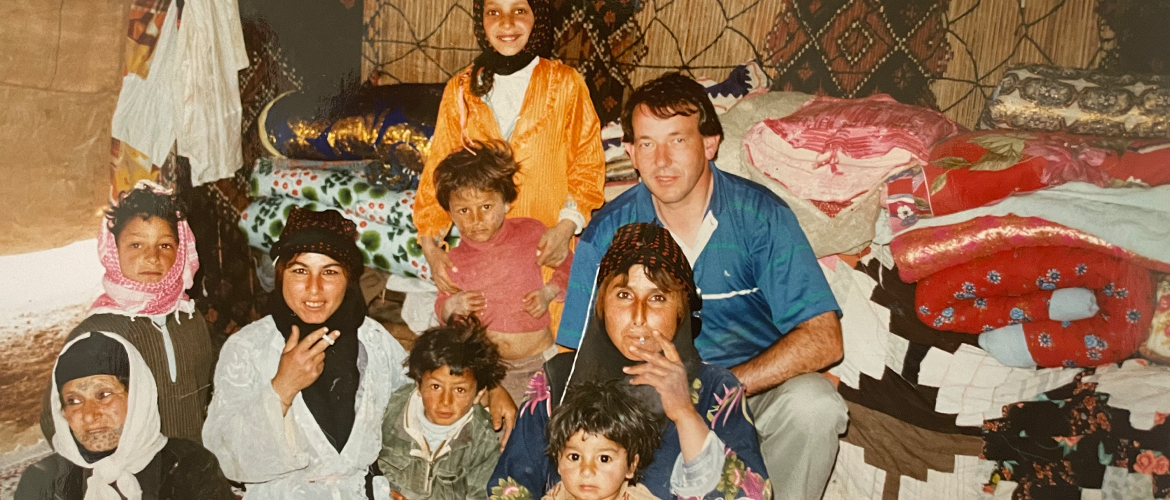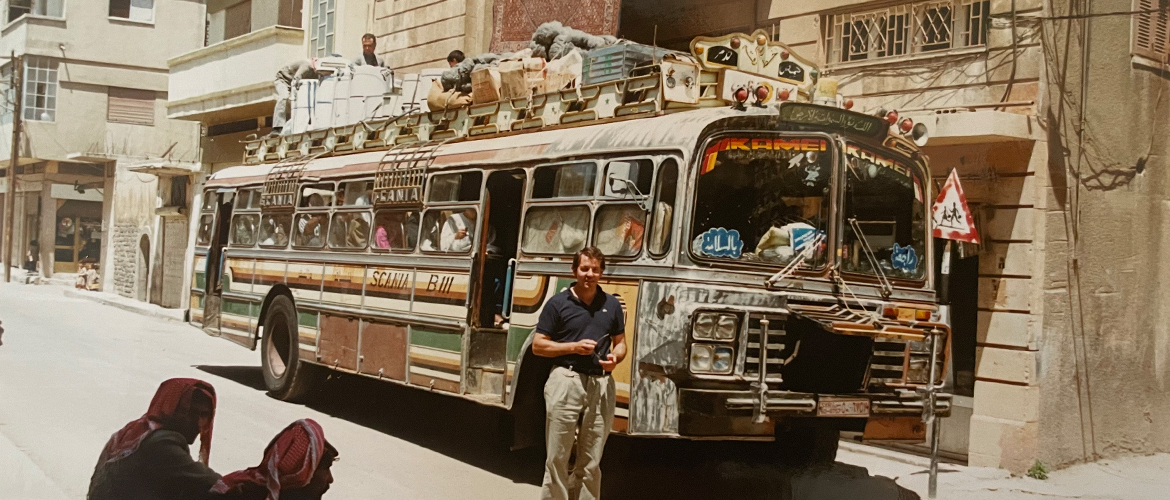Frans van der Lugt (1938) seen through the eyes of his brother Henri van der Lugt (1950), who is 13 years younger
I don't remember much about Frans from my youth. I know I looked up to him with pride. I didn't see him often until I got married, but when he came to the Netherlands especially for our wedding to join my wife and me for the church in marriage, I got to know him much better. I found out that we had a lot of the same ideas about our fellow man. He mainly in the field of mental health and I in the field of physical health. Later, when I became a general practitioner, it turned out that my care was also to a considerable extent on the spiritual plane.
Visiting Syria

In 1990 I went to visit Frans in Syria with Carla, our sister. He took ten days off to show us Syria. An unforgettable experience.
We were received in Damascus at the Jesuit house, where we slept and ate for three days. During the day we visited all sights, where the Souk made a big impression with its liveliness and numerous shops. We witnessed a liquor store being closed by the police. All alcoholic drinks were confiscated. To our surprise, the store reopened the next day and sold alcoholic beverages again. This is Syria, said Frans. Probably a ransom has been paid and everyone gets on with their life.
In the Souk I visited a Hammam (bath house) with Frans. First you are massaged by a very strong man, who also stands on your back. After we went on to the shower room and then through rooms with increasing temperatures to a steam room of 90 degrees. Finally we could relax in the tea room where we also had a profound conversation. Frans never missed a moment to talk about the important things in life. Afterwards we drove back to Homs where we visited the town of Ma’loula on the border with Lebanon. This is the only place where Armenian is spoken, the language that Jesus spoke.

We stayed in the Jesuit monastery in Homs where he was later murdered. At the table with the nuns and the other Jesuits we had lively discussions with lots of laughter.
Visiting Al Ard

In Homs we met many of Frans's friends, including Patriarch Alexi of the Orthodox Church, and a well-to-do Syrian contractor who had converted to Christianity and did a lot of good work for the poor. He also made money available to build Al Ard near the town of Al Qusayr. We also visited this project of Frans. Then there was only a dilapidated building. It was the wish of Frans to create a center on this spot, where mentally handicapped people could find a daytime activity on the vineyards and olive plantations. In Syria they did not yet have facilities for these people, as we know them in the Netherlands. It also had to be a center for reflection where believers of different religions could meet and meditate.
Walking with the students of Frans
We also met many students from different ethnic backgrounds and beliefs for whom Frans was a student pastor. Everyone felt a special warmth towards Frans. We made a one-day hike with a number of them. I spent a long time talking to a medical graduate who was working as a nurse while traveling because he couldn't find a job. At that time there was an excellent infrastructure, free education and healthcare, but a lot of unemployment. This doctor wanted to get married, but you could not marry until you had a house. This was a utopia for him. He still lived with his parents, so it was a hopeless situation for him to start a family. His only hope was to be able to specialize abroad. It was only at this point that I realized how well we are materially in the Netherlands. However, how well family members in Syria look after each other is an example to us.
Visiting a family in the desert
During our visit to Frans we were also very hospitably received by a number of families in their house with lots of tea and all kinds of sweets. That hospitality comes naturally, probably because Syria was on the trade route of Persia and Greece for centuries. We also visited the city of Palmyra, one of the ancient trading places east of Homs with its many Greek and Roman remains of temples and other buildings. After visiting Palmyra we went deep into the desert. Somewhere off the road we saw a Bedouin tent. Frans went up to the resident and after ten minutes we were invited in. The daughter immediately started sprinkling water on the floor, as a sign that we were welcome, and goat's milk was distributed. The family consisted of a father, a mother, a son and a daughter. They lived off the goats and camels, which they caught even deeper in the desert near the Iraqi border. They could just live on this. At one point Frans told me I was a doctor. The father then requested that I examine his daughter because she had so much stomach pain. I was accompanied by her brother to her sleeping nook. When I wanted to partially bare her belly, he immediately informed me that this was not the intention. Then he took my hand and guided it under her clothes to her stomach. When I examined her I felt a great soft resistance in her lower abdomen of about 6 inches. My diagnosis was a dermoid cyst (a cavity with a solid rim filled with skin, hair, sebum, grease and nail debris as a result of a construction error in the body). When discussing with her and the parents, it emerged that there was no money for an operation. It was only important to the daughter that she would remain a virgin if she had surgery. Frans was very fond of the daughter and he would see what he could do for her. Later I heard from Frans that he arranged for her to be operated while retaining her virginity.
Visiting the chief of Arak

Then we visited the walled desert city of “Arak”. Here too, Frans went ahead to a door in the wall. He spent at least 20 minutes there talking to a group of women, after which we were received by the chief and his wife. In the village a kind of revelry arose among the children, who all wanted to have their picture taken with us. A sheep was slaughtered, we were seated at a table and enjoyed a delicious meal. After the meal we were asked to stay the night, but that was neatly rejected by Frans, because we have to be in Homs the next morning. The host did insist on showing the master bedroom, which should be seen as a special gesture of hospitality. Then we were waved goodbye by all the villagers. This day made a big impression on me to see how Frans, with his openness and honesty, finds friendship and love with every Syrian.
Back to Damascus

We also visited a day trip to the crusader castle Krak de Chevalier northeast of Homs. A beautiful place, but what it served for in the past did not make me happy. We made the way back to Damascus in the “HOP HOP”. These are buses that are beautifully decked out on the outside and run between all kinds of cities for almost free. A ticket for Homs to Damascus cost 85 cents for 180 kilometers. A ride that took us all day. Everything went on the bus, chickens and goats, centrifuges and other materials on the roof. Frans spent the entire trip talking to everyone in Arabic and I couldn't believe my eyes. A nice end to a wonderful journey.
The last words of Frans
I got to know my brother well and I am very proud of him. I had him on the phone four days before his death. He turned out to have a satellite telephone as an emissary from the UN. All negotiations with the occupiers of Homs went through him. He asked me to arrange a hospital bed in the Netherlands because he was seriously malnourished and ill. Immediately after the surrender of Homs, he would come to the Netherlands. Unfortunately it turned out differently. Fortunately, during my trip I saw the place in the monastery garden where he is buried.
The most beautiful pronunciation of Frans has always stayed with me:
"There is much good in every person"















